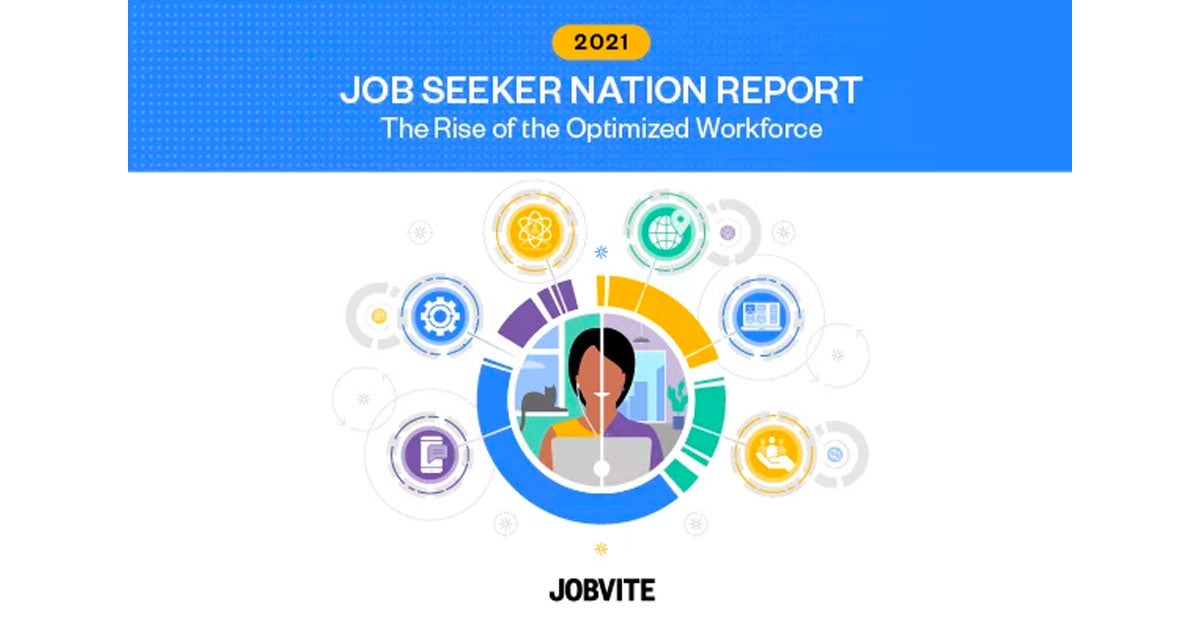Learn how the workforce is responding and adapting one year into the pandemic
This just in! Jobvite’s 12th annual Job Seeker Nation Report has been released, uncovering a profound change in concerns, challenges, and priorities for workers while navigating the job seeking process amidst COVID-19.
At 6.2%, the U.S. unemployment rate today is lower than it was in April 2020 at the beginning of the pandemic; however, it remains well above its pre-pandemic level of 3.5% in February 2020.
The pandemic has greatly altered the dynamics of the U.S. labor market, bringing about what we believe to be the rise of the optimized workforce. COVID-19’s significant impact on the workforce has made it evident that employers and recruiters must have a complete understanding of how to adjust efforts to meet the demands of varied realities—for individual work experiences of today and tomorrow.
To little surprise, the job market shift has led stress levels, job insecurity, and financial concerns to skyrocket, especially among working parents. In contrast, purposeful awareness of social and racial justice issues has drastically altered job seekers’ expectations of employers, particularly when it comes to COVID-19 safety measures, diversity initiatives, company culture, and remote work.
The 2021 Job Seeker Nation Report offers an in-depth look at the behaviors, views, and preferences of the modern workforce.
About the Job Seeker Nation Report
Year after year, Jobvite surveys hundreds of U.S. workers for its annual Job Seeker Nation Report to better understand the realities and preferences of today’s job seekers. In 2020, Jobvite conducted two surveys. The first was pre-pandemic (February) and the second was in the beginning days of the health crisis (April), with the data revealing a dramatic shift in the job climate.
As a follow up, the 2021 Jobvite Job Seeker Nation Report surveyed roughly 1,500 adults in the U.S. to gain awareness of the current state of the workforce roughly one year since the onset of the pandemic.
Here are a few of the big highlights from this year’s report!
State of Job Seekers Today
The challenges of the past year have resulted in a growing fear of job loss.
- 41% report that they, or someone in their immediate family, is afraid of losing a job – a 13% increase compared to 2020
In addition to concerns over job loss, the leading stressors in the job seeking process include:
- Catching COVID-19: 40%
- Mental health struggles: 38%
- Long work hours: 34%
With an increasing number of remote interviews, 36% of job seekers, unfortunately, could not participate in a video interview due to a lack of adequate access to technology or Wi-Fi.
Remote Work
With millions of U.S. job seekers moving to working remotely over the past year, continuing to have a choice of work environment and location is now of utmost importance to job seekers.
- 35% have declined or would decline a job offer that required them to work full-time on location, in an office, or at a worksite
- 74% said remote work figures in their decision to reject or accept a job offer
Yet even with an increase in remote work, company culture remains important.
- Despite the rise in remote work, 86% say company culture is somewhat important or very important to them, up from 37% in 2019. Yes, as workers, we are still social beings and want to feel connected and part of a great company and team
COVID-19 in the Workplace
The pandemic has drastically altered the expectations employees have of their employers.
- 60% have inquired about current or prospective employer’s COVID-19 safety measures
- 49% think employers should require employees to get the vaccine, while 36% disagree, causing a challenge for employers as they navigate varying opinions on the topic and manage employee relations appropriately
COVID-19 and the rise in remote work has resulted in 42% of employees working more hours since the onset of the pandemic.
Additionally, 25% of workers have taken advantage of their employer’s mental health benefits more since COVID-19 hit. We are so happy to see workers prioritizing their mental health, taking care of themselves, and reaching out when they need help.
Download the Full Report for More
These are just a few of the key takeaways from the 2021 Job Seeker Nation Report. Download the report today for hundreds of additional statistics and insights to help talent professionals understand how adjusting efforts to meet the demands of the job market today will progress into the future.




